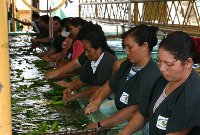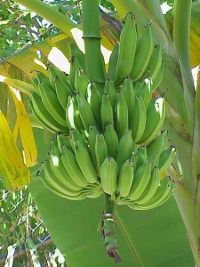Bananas
Author and Page information
- This page: https://www.globalissues.org/article/241/bananas.
- To print all information (e.g. expanded side notes, shows alternative links), use the print version:
Some of the previous pages in this section such as those on sugar and beef highlighted a number of concerns. These concerns included the burdens on the environment, on people’s healths, on nations’ ability to cope, and other issues. Such examples begin to only hint at the deeper waste of capital, resources and even labor.

This page looks at some of the issues around the banana industries, and as well as showing similar issues as the previous sections, highlights some concerns about the fragility of entire economic regions that have become so dependent on just a few areas, such as banana exports.
As mentioned in an earlier page on this section, numerous issues combine, contributing to further deforestation, environmental degradation, poverty, hunger and so on. As a reminder of what was said on the Effects of Consumerism page it is mentioned here again:
When looking at the destruction of rain forests in Central America, a similar pattern to what is mentioned above, was observed by John Vandermeer and Ivette Perfecto, in their book Breakfast of Biodiversity: The Truth About Rain Forest Destruction, (Food First, 1995), and also highlighted by editor Douglas H. Boucher, The Paradox of Plenty; Hunger in a Bountiful World, (Food First, 1999), pp. 86—87. Summarizing that here:
The patterns of inter-related issues that would affect forest destruction could be seen in many different reasons, such as banana production, citrus and other fruits, rubber tree plantations, and other commodities. Yet, these were
similar politically if quite distinct biologically, and would typically include the following stages:
- Those laid off must seek other means to survive, and in poor countries and rural areas that may mean growing subsistence crops on marginal lands
They continue to point out the flaws in the accepted Malthusian theories of population growth placing demands on natural resources.

Vandermeer and Perfecto use the example of banana production in Central America and the Caribbean to show an example of such a pattern of inter-related issues that affect forest destruction.
They also point out that most other commodities follow these patterns (and further examples are also discussed on this web site’s section on the causes of hunger).

The further expansion of the banana industry in the late 1980s and early 1990s they hinted to, was part of the first step described above. That is, to produce for the emerging larger European market with the potential unification and large free trade zone.
This led to things like clearing rainforest for banana plantation, mass migration to work the plantations and so on.
A period of boom was followed by a bust, so more people were left unemployed, settling on marginal land or clearing small areas of rainforest to grow subsistence crops just to survive and so on.
They wrote this in 1995 and a few years later we saw the banana trade war between Europe and USA.
- The United State at the request of American corporations in Central and South America were trying to destroy the Caribbean markets via complaints to the World Trade Organization of being restricted access to the European market.
- The Caribbean markets were getting preferential access to European markets.
- But because of the potential of a larger market there, the Caribbean region which is heavily dependent on the Banana industry and the European market to export most of its bananas, also suffered potential economic threat.
- The additional banana growth in Latin America has been accompanied with social and environmental problems, as described above by Vandermeer and Perfecto and as they also update in an epilogue to their book.
Underlying all this though, is how both the resources in Central American and the Caribbean have been largely diverted away from local needs, to exporting a few commodities in order to meet wealthier consumption needs
. (For more on the banana trade disputes, see this site’s section on bananas. It talks in more detail about the trade dispute, the corporate influence and effects on the poor.)
The banana example, therefore, touches many different issues, including labor exploitation (as Chiquita, one of the main corporations involved have been even accused of killing workers), environmental degradation, poverty, economic issues, development and so on.
- We are seeing, also with coffee especially, the emergence of
fair trade
products, like fair trade coffee, where producers and workers are paid fairer prices for their products. - While that is extremely important, the other issue for certain commodities such as bananas, coffee, tea and so on, is the mass production of it in many countries mainly for export, while resources for local development and building the economy are neglected.
- Structural Adjustment, free trade agreements, such as the Free Trade of the Americas, and other international agreements (as discussed elsewhere on this web site) are heavily geared against such self-sufficiency based development. (And often the term free trade is in name only, as detailed on the free trade section of this web site.)
- This ensures the poor are
adjusted
to become continually dependent on external factors, such as commodity prices (which get cheaper and cheaper with more production), and tastes. - Such agreements also prevent local economies from developing by preventing the multiplier effect of money as it would circulate through an economy. Instead, money comes in and goes out at just the production level.
- Hence, local purchasing power is not developed, so the real market is in exports. This continues to create more inequality and contributes to other problems such as crime and corruption.
That is not to say that bananas should not be eaten at all in protest, or production stopped.
- But this does begin to highlight the injustices that go with the current political and economic ideas behind the way such commodities are produced.
- People will likely want to continue to eat bananas, but the overproduction means there is much wastage.
- Additionally, nations should be able to have more freedom in determining what to produce.
- Instead, international institutions such as the IMF and World Bank, have a lot of influence on the third world and how third world countries should adjust their economies. (See this site’s section on structural adjustment for more details on that angle.)
- At the same time, actual production methods etc by the large multinationals need to be addressed for their labor practices and environmental degradation.
Of course, these options are all fraught with political obstacles, such as geopolitics, power play, influence from wealthier nations, and so on. Else, these situations likely would not have arisen or become so problematic in the first place! (For a far more thorough discussion on ways forward, on the banana and rain forest destruction issue in particular, but also touching all major issues as they are all inter-related, see Vandermeer and Perfecto’s work, mentioned above. In addition, many areas across this web site discuss these issues in more detail with additional examples. Links to those pages are also given towards the end of this site’s section on consumption.)
As with the preceding examples then, there is much wastage
. That is, there is a lot of waste due to things like all the resources used to pay for the buildings, office materials, infrastructure support and all the other cascading resource expenditures used to maintain these inequalities, and to maintain unequal competition/monopolization. There is also a lot of waste in the sense of accompanying poverty, dependency and social destruction. Human potential and capabilities are destroyed and wasted because of the trade disputes
and agreements
. This wasted wealth is, more generally, due to wasted capital, wasted labor and wasted resources.
We now turn to this general issue of waste on the next page.
Author and Page Information
- Created:

